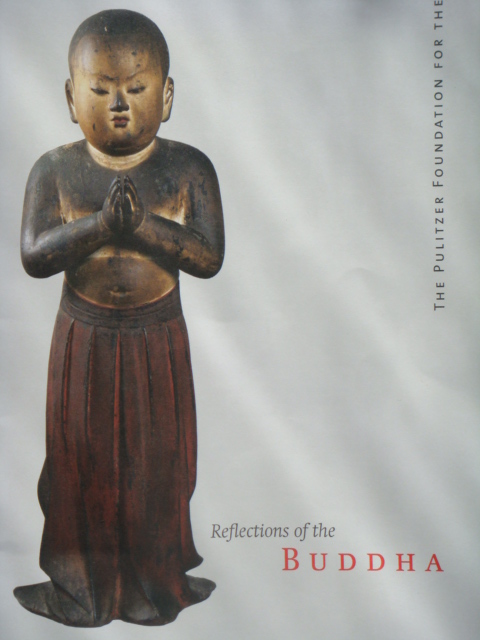Good morning!
In and after our sittings we have been enjoying a beautiful autumn morning, penetrated by the pure sound of rain falling on leaves, permeated by fresh moistened air, and pervaded by abundant green plants.
We are now in the best season of fall equinox, neither hot nor chilly, and in the best state of sitting, with feeling and fantasies fallen. Soon we will see flowers and fruits, leaves and limbs falling, the entire body exposed to the golden wind.
This is the season of harvest. So somehow we feel the satisfaction of harvest. Yesterday Erin and I went to the Pulitzer Foundation for the Arts, which is exhibiting beautiful Buddha and Bodhisattva statues and paintings. There were visitors and viewers appreciating them.
We talked with the visitors who came to see us about Buddhism, Gotama, Limitless-life or -light (Amitâyus, Amitâbha) Buddhas, Avalokiteshvara Bodhisattva, etc. There is also a small figure of two year old Prince Shotoku. He is regarded as the founder of the Shotoku School.
Someone asked if Buddhas are different. Dogen said that all buddhas become Shakyamuni Buddha. When we become buddhas, we become awakened in unconditioned peace and prognosis, without separations and distinctions. Shakyamuni, Shotoku, Dogen, et al., are all buddhas.
Dogen said, “Without limited minds, we have limitless luck.” The visitors appreciated and adored the peace and prognosis of Buddhas and Bodhisttvas. They had better become buddhas themselves, and enjoy peace and prognosis.
It is not easy to become a buddha, due to karmas. Mahayana tells that we are already buddhas, if only we stop our karmas. Karma creates habits, which drive us as if by instinct, seemingly inevitable. But karma can be stopped, along with all its resultant effects.
Yesterday we cleaned the pond. We saw those fish in the pond panicking with the suddenly decreasing water. We hope they are now in fresh and full water – their “palace.” It’s only a small pond and limited living in the small pond for us humans.
It is normal for them, but normal is not necessarily good. The Buddha said that we are like the fish in a drying pool. We must know our true world and true life – imminent and inevitable birth and death, and beyond birth and death.
The Buddha said,
Better than the one who would live one hundred years
not seeing immortality is the one who would live
one day seeing immortality.
So, our practice is really seeing birth and death, immortality, and the highest dharma. Our practice is itself the highest dharma. Only when we practice – sit, stop karma, see the dharma – can we become buddhas in ultimate peace and prognosis here and now.
Dogen said our practice is the path cycle of aspiration, action, awakening, and unconditioned peace. Whenever we practice this path, we can settle in unconditioned peace and unsurpassed awakening, the highest dharma beyond our normal ways.
Here we find ourselves in true freedom and full function. Freedom is not getting something, but renouncing possessions, i.e., possessedness. Only when we are freed from our selves can we attain great, mature, and joyful minds and worlds.
Sawaki Roshi said that it is useless to use the limiteless life as a five-foot body. We must let our bodies and minds fall to attain free, full function. Then we attain limitless life, which is attained only by limitless learning because of our strong, stagnant karmas.
Witnessing limitless life-light-liberation-love-learning, we practice it with all, which is good in the beginning, in the middle, and in the end, good for all in time and space. Our practice is itself witness of the ultimate buddha function and buddha fruition.
9/18/11
Standing Prince Shotoku at Age Two (the front cover of the exhibit of
Reflection of the Buddha at the Pulitzer Foundation for the Arts,
September 9, 2011 – March 10, 2012, with meditation workshop, Q&A,
sessions, etc. available by the Buddhist Council of the Greater St. Louis)

